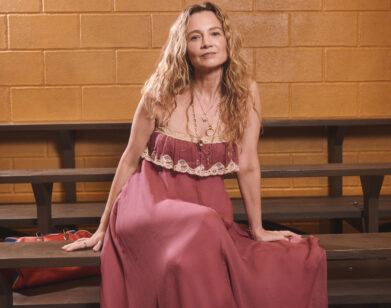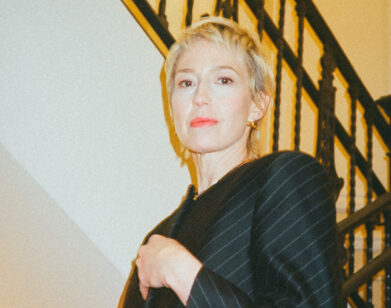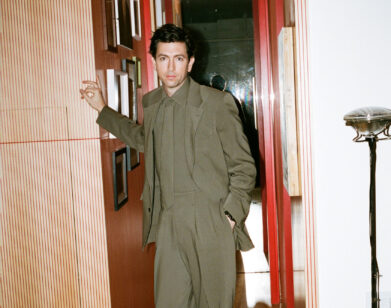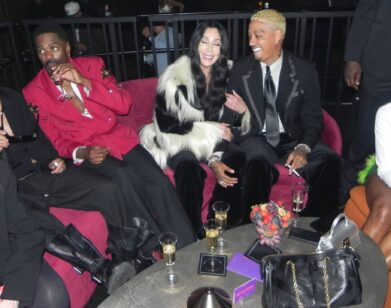BACKSTAGE
For Colman Domingo, Telling the Story of Nat “King” Cole Was Personal
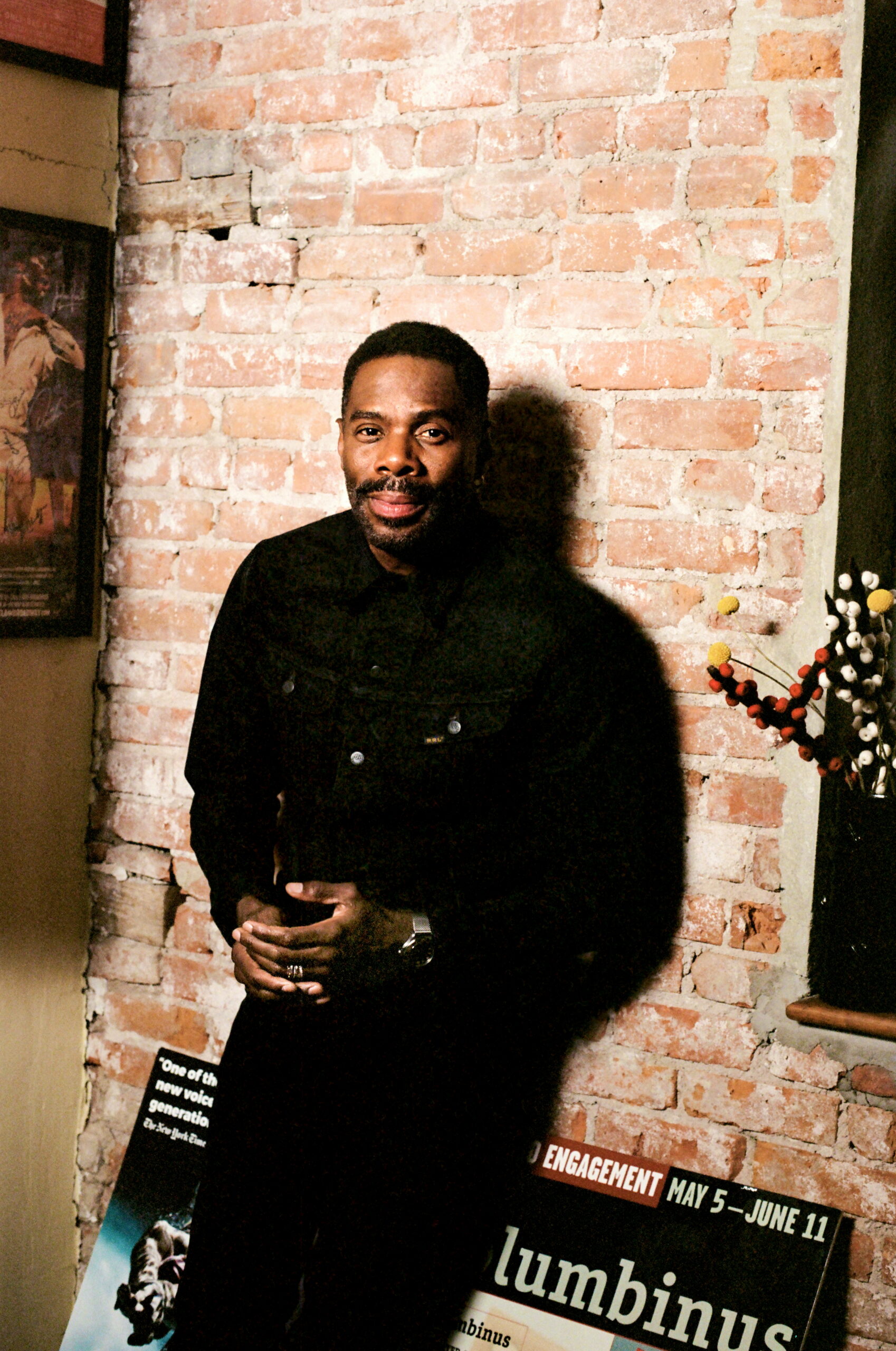
When Colman Domingo and Patricia McGregor set out to write Lights Out: Nat “King” Cole, a new play about the titular singer and pianist’s attempts to become America’s first Black television host, they wanted to do so on their own terms, with a careful balance between work and family. “We’ve got to live a full life in order to bring this to our work,” the two-time Academy Award-nominated Domingo told McGregor, the artistic director of the New York Theater Workshop, when they got together earlier this month before the show opens this week. Working beyond the cramped quarters of your typical writer’s room—by the pool in Mexico, for instance—allowed the duo to think more deeply about Cole and his relationship with Sammy Davis Jr., played by Dule Hill and Daniel J. Watts, respectively. The production, McGregor says, is as much a biopic as it is “a love letter to my Black brothers and their extraordinary journey and especially these two, who we have built the show for and around.” While Lights Out was in previews—and Domingo prepared to host the Costume Institute Gala—the collaborators convened once again to discuss the legacies of their subjects, the beauty of tap dancing, and how they both honor their late mothers in both work and life.
———
COLMAN DOMINGO: Hi, Ms. Patricia McGregor.
PATRICIA MCGREGOR: Hi, Mr. Colman Domingo.
DOMINGO: How did our preview go last night?
MCGREGOR: Okay, let me start with this. I walk in and I recognize a profile in front of me, and it’s Ben Vereen. So I get to experience the show through the lens of this legend, like Nat, like Sammy, like Eartha, many people of the people who he knew–
DOMINGO: What did he say?!
MCGREGOR: He said, “First of all, I love the show and I’m coming back.” I said, “I’m done. That’s all I need to know.” He said we got it right in terms of embodying the spirit of who these people were, and also adding our own sense of questioning and artistry. So I feel like it was a baptism last night. And you know me, I’m in the first week of previews, so I still have a whole bunch of notes.
DOMINGO: You’re basically dynamite and I’m sugar this whole time.
MCGREGOR: When we work together, we’re sugar and dynamite, but you never know which one.
DOMINGO: Exactly, but I do feel like in previews it makes sense for you to be the dynamite and I’ll come in and be the sugar. I love that you handed me the floor the other night because I’m like, “I’ll give all the sugar because mama’s got to make sure everybody’s got their notes and things right.” But daddy comes in every so often, picks up the baby, sits and holds it for a little bit, and then sends it on its way.
MCGREGOR: Speaking of, should we start at the beginning?
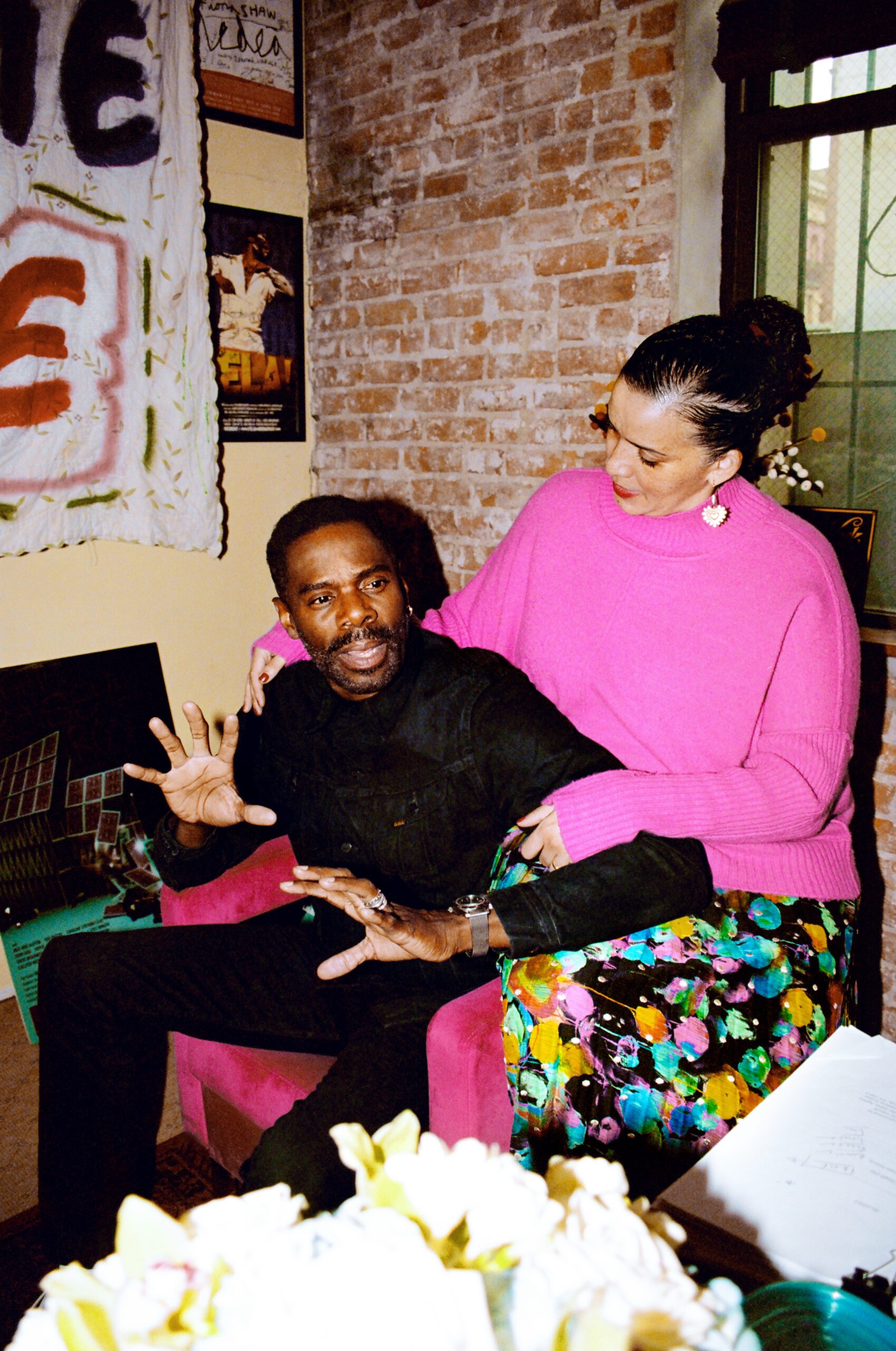
DOMINGO: Absolutely. I just love the fact that we started the way we started, which was very organic and with questions. Not only questions about Nat, but about Sammy and about ourselves as artists. I think that’s where it works best. What I’m gathering, especially for a New York audience, which is different than the Los Angeles audience and the Philadelphia audience, is that New York audiences believe that they’ve seen it all. I’ll be very honest. I think that they come in a bit jaded because they’ve seen it all. I think that’s why we attacked it the way we did, as a fever dream, because we wanted to make sure that you can’t just walk away with some great feeling. You have to walk away with more of a complicated, knowledgeable feeling about these artists. And for us, it extends way past Nat. It extends to us. We have a great, beautiful task because we’re dissecting America through that lens. So I think that’s our origin. Right?
MCGREGOR: Yes.
DOMINGO: What do you think?
MCGREGOR: Well, yeah, and I will say that there was something so generous when I heard that you were in conversation with Zak Berkman at People’s Light talking about doing this show. At first I was going to come on just as a director. We know that we’re both multi-hyphenates and we’re both trying to investigate and question the world and create new forms. So when you asked me to co-write, it was such an honor. Part of this piece is about how we are not alone as we break barriers. How can you bring your people with you to hold you up, hold you down, keep you grounded, and hold people’s feet to the fire? So I’m sure it would have been fabulous no matter which way we went, but I loved that we got to co-write together. I think in some ways, the spirit of Nat and Sammy is a mask for the spirit of you and I.
DOMINGO: It’s even radical the way we wrote it, by swimming pools with family, and when we came to Mexico. It’s almost unheard of. That’s why I’ve really been loving this journey with you, friend, because we have been on this path for many years and now we have leadership positions and we can really affect how we have a balance of work and life. We’ve got to live a full life in order to bring this to our work. You and your grant makers and people who think that we need to do it in a room somewhere, we’re like, “No, our room is by a pool because we need to be outside nurturing our families and we can still get the work done.”
MCGREGOR: And I love that reexamination of how we work. We’re perfectionists, we’re passionate about what we do, but how can we be human beings and not just commodities? It’s the big gift we have to give to the world, and we take it really seriously and pour ourselves into it, but it can sometimes eat you up and just leave the rind. I think in this journey with Nat and Sammy, we’re also looking at some of the things that were eating him up, and what we inspire for people is to ask, “How can we be whole, even as we squeeze the juice of ourselves into this art form?”
DOMINGO: My god, my god. And listen, I want to talk about Dule Hill and Daniel J. Watts in particular. The rest of our cast is fantastic, but there’s something so beautiful that we’re experiencing now on our third production, especially with Dule. Dule has dropped in, it’s in his body in a new way, and he’s experiencing it anew. There’s something that’s even more charismatic and grounded. I wonder if that’s the father in him as well. The same with Daniel J. Watts. They’re both bona fide stars, the kind that come along very rarely. If Daniel J. Watts is not doing everything his heart desires after this production, I have zero faith in this industry.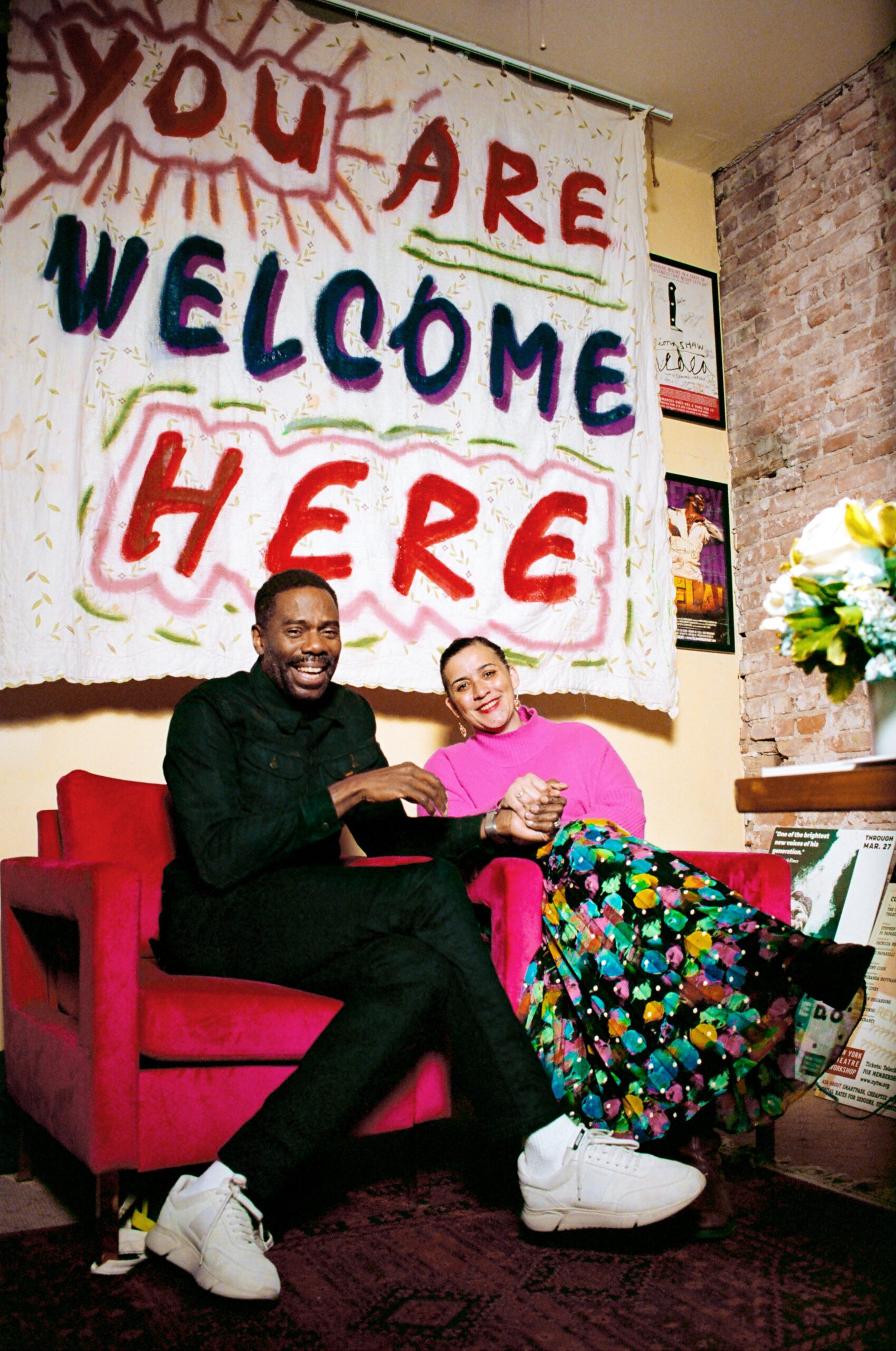
MCGREGOR: Agreed. They are at the top of their game, the heights of grace and glory, style and entertainment. It’s also a love letter to my Black brothers and their extraordinary journey and especially these two, who we have built the show for and around. They are core partners and have guided our path. I’m curious for you, Colman, what’s your favorite part right now? Mine changes all the time.
DOMINGO: It’s still the same but it always feels brand new, which is “Me and My Shadow.” I think it’s because that is the meat of our piece. First of all, it just has many, many phases that it goes through. I think the way the audience experiences it is what I love. We keep setting up in the musical that it’s a fever dream, that Nat King Cole did not tap as far as I know, but in our experiences, he has to get it out. Sammy’s the one to help him articulate that, and he joins him in this surrealistic expression. I love the efficiency and the spectacularness of tap. I watched that one moment when Daniel slipped the other day, and boy was that fantastic, because he’s so engaged with and available to what’s happening in the moment. He paused and let it happen and then got right back into step. I thought that was expert.
MCGREGOR: That piece always knocks my socks off. We were watching it yesterday and people just stood at the end of it, they had to, I think it’s because it’s working on so many levels. There’s a virtuosity and joy in their tap. It feels like we get to be in this very private moment when they’re expressing that core part of the soul that you don’t want to tell anyone in this virtuosic way. In a funny way, one of my favorite moments right now is the bows, because every single person has their opportunity to shine. As much as there are two stars in the center of it, it’s also an ensemble piece. So the bows are not just bows that are about us and the performers taking their very well-deserved applause. It’s also an opportunity to pass it to the audience and say, “And now what are you going to do? How are you going to run your leg of the race?”
DOMINGO: Patricia, I’m going to ask you something personal. How are you staying fueled and inspired, especially at this time? You are wearing many hats, first of all, and I want to tell you how much I admire you, your strength and your capacity for love, especially knowing that you recently lost your mother and you didn’t miss a beat. Where’s all that light coming from, my friend?
MCGREGOR: Thank you, my friend. I wear many hats, and I think right now, the most important hat I’m wearing is the daughter of Angela Francis McGregor and Oscar Franklin McGregor. My mom passed the day before we started tech and my father passed about a year-and-a-half ago. The day before she passed, I held her hand and I asked her to pour into my hands, “Pour the strength, pour the love, pour the purpose.” She was a painter. She was an activist. She was a champion of everyone finding their own voice and using it for good in the world.
So I have my moments, I play my songs. I think that’s one of the reasons music is so powerful. The Nat King Cole CD was worn out in our house. We played that in the holidays, and she saw this show in Los Angeles. She loved this show. She loved the work that we do. So I’ll play a song, a Nat song, I’ll play “I’ll Take You There” by the Staples Singers, which was one of her favorite things. I’ll play some songs and I’ll weep for the missing of her being here now. But I feel her walking with me. I feel her purpose. I feel her capacity for love. I feel her dedication for a just world and her joy in art. Some days are harder than others, but I feel incredibly purposeful and incredibly grateful. We examine gratitude in this piece, but I feel authentic gratitude for the people I get to work with, the work I get to do, and the way in which I get to honor her legacy.
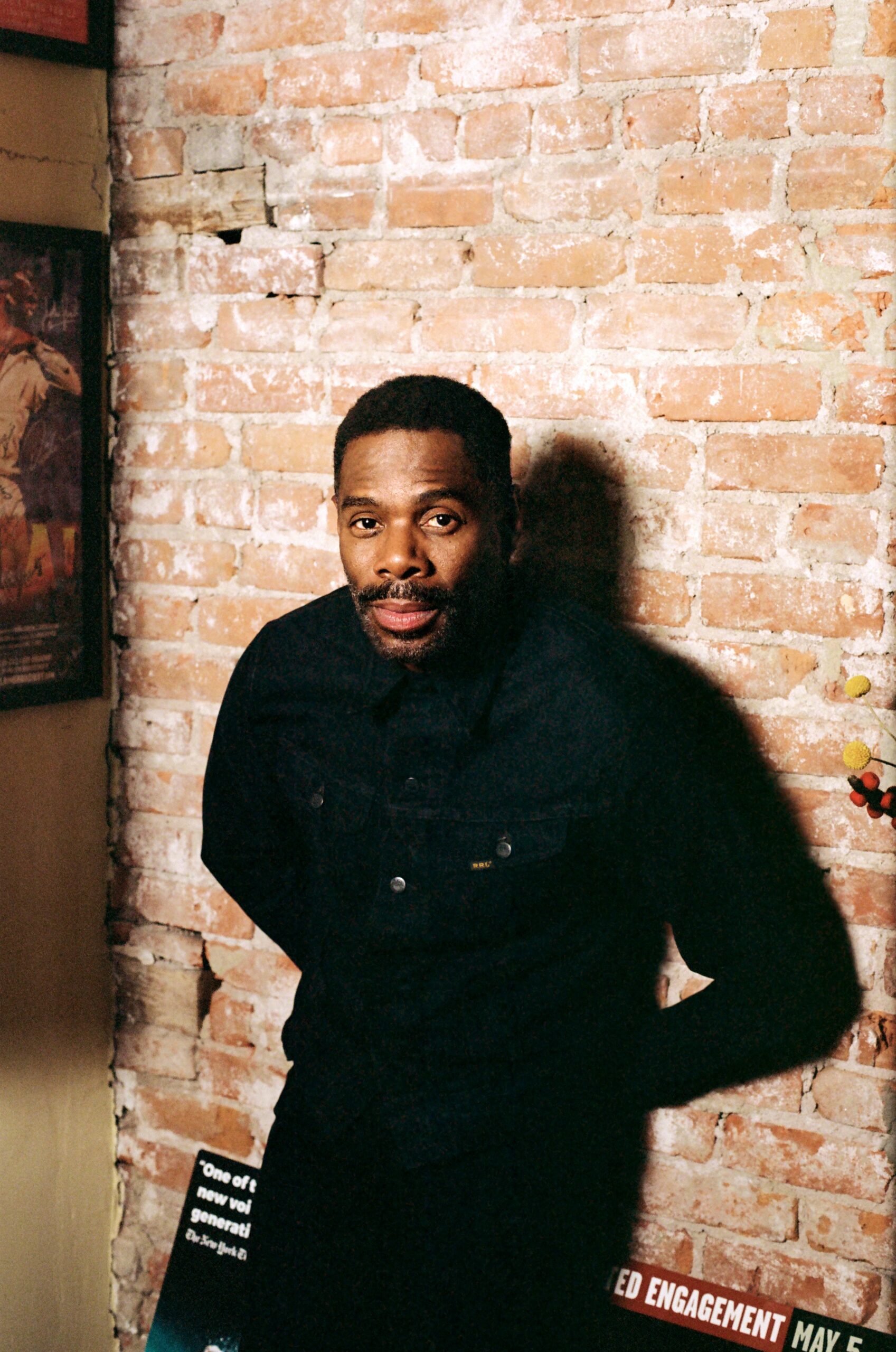
DOMINGO: Thank you for that. When I lost my mother, literally the day after I auditioned for Passing Strange, that was the thing that was fueling me. That’s the beautiful thing I think that we have as artists. If we have art, we reach towards it and it opens us up even more. It cracks open our hearts in a different way. I know that we’re different human beings, especially when we lose that physical manifestation of the womb that we were a part of and it becomes a million dazzling stars. I was so bereft, but I had to keep working, I had to keep going. I said, “The thing I loved the most about my time on this earth with my mother was being a son, was being someone’s son.” And my friend Melissa said, “Well, you’re going to pour that love into everything that you do.” I thought that was the greatest gift to hear.
MCGREGOR: We both named our companies for our mothers.
DOMINGO: It just dawned on me. I’m like, “Oh, Angela’s Pulse, that’s your mom.” We want to make sure that their energy stays alive.
MCGREGOR: Yes.
DOMINGO: And it’s not for naught. I’m like, “With all the things I’m doing, the only person’s review or critique I really need is my mother’s. I’m just doing it for her.” You know what I mean?
MCGREGOR: That’s it. And how about you? I’m blown away by your ability to be so present when you’ve got the Met Gala coming up. You’ll come into rehearsal or a preview and you say, “Okay, I told Spielberg I’ve got to get downtown for my show. How are you present, caring for yourself, being clear about what you need in this moment? Like Nat, you bring so much light and attention to it all.
DOMINGO: Thank you. You know what I think, Patricia? I think that maybe because I am 55, I’ve learned such a great power in the word “no,” because I know what my capacity is. When I’m present, I’m present. I want to be completely 100% wherever I am. I don’t like to split all that, because I feel like for years I did that and you start to run on empty. Even this morning, people are like, “Oh, you’re always so busy.” I’m like, “Yeah, but I have a wellness morning.” I woke up this morning, my husband and I went to the gym together, we went for a walk, we had some coffee. Things to make sure you’re taking care of yourself so you can go and be present and do all the work.
Even last night I had some friends who were like, “Oh, we’re going to the Bowery Bar after this.” I’m like, “Oh, no, I’m not going there. I have to go home because I have a practice of wellness. I’ve got to be up and present and I have a long weekend.” That’s what being a grownup is.
MCGREGOR: Yeah. Anyhow, with Nature Boy, when we thought about all the songs in the piece, it really comes down to that line, “The greatest thing you’ll ever learn is just to love,” and the second part, “And be loved in return.” I’m so grateful to love you and to be loved in return.
DOMINGO: And I love you. I’ll take that with me as I go out into the world today.

